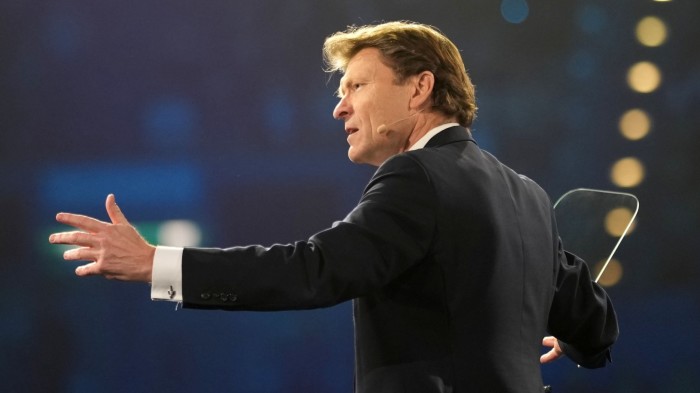Stay informed with free updates
Simply sign up to the UK energy myFT Digest — delivered directly to your inbox.
The deputy leader of Reform UK has told green energy bosses that the party will “strike down” industry subsidies if it wins power in the next general election, in a warning shot that will put energy policy at the forefront of political debate.
Richard Tice said in a letter sent to leading renewable energy developers, including SSE, Scottish Power and Ørsted, that it would “reassess all net zero-related commitments” as a result of their “intolerable costs” to the economy.
The Boston and Skegness MP warned companies planning to bid in the UK government’s upcoming auction round for wind and solar subsidy contracts that they risked financial losses because the net zero agenda “no longer enjoys cross-party support”.
The rightwing populist party led by Nigel Farage has enjoyed a surge in support since the general election a year ago. A YouGov poll released on June 26 found that if a general election were held the following day, Reform UK would be the largest party in a hung parliament.
“If elected — or if we hold the balance of power — we will immediately reassess all net zero-related commitments,” Tice said in the letter he also posted on X on Wednesday.
“As a first step we will seek to strike down all contracts signed under AR7 [the upcoming subsidy auction]. Should you choose to participate, you should treat any long-term revenue stream as politically and commercially unsafe.”
The letter presents a problem for the Labour government as it pins its hopes on this year’s auction of subsidy contracts delivering the largest ever amount of new renewable energy capacity, allowing it to make significant progress towards meeting its target of decarbonising Britain’s power sector by 2030.
The contracts will involve the government guaranteeing developers a fixed price for the electricity they generate during the first 20 years of a new project, funded by a levy on electricity bills.
Developers have to pay back the difference if the wholesale price is higher than the agreed fixed price, meaning the contracts can cost consumers nothing or mean they are paying less for electricity than they otherwise would.
Labour, which has also pledged to bring energy bills down, argues that decarbonising the power system will make energy supplies more secure as providers rely less on imported gas.
The clean power target is one step towards the UK’s legally binding target of net zero emissions across the whole economy in 2050, which was enacted in 2019 by the then-Conservative government led by Theresa May.
Kemi Badenoch, the Conservative party’s current leader, said in May the goal was “impossible” to achieve without lower living standards or “by bankrupting us”, rupturing the two main parties’ consensus on net zero policies.
Farage has described net zero as “lunacy”, arguing the policy would destroy jobs and could become the “next Brexit” in terms of politicians being “out of touch with the country”.
A Labour party spokesperson accused Reform UK of “actively trying to discourage businesses from investing in clean energy in the UK — leaving bills higher for families, threatening hundreds of thousands of good jobs across the country and putting our energy security at risk”.
Labour added that Reform was “disgracefully trying to undermine the UK’s national interest”.
Ana Musat, executive director of policy at Renewable UK, said new wind and solar farms were driving “new jobs and investment into places like the Humber, Teesside and Scotland”.
She added: “Every recent opinion poll shows that the vast majority of people support the development of renewable energy.”
James Alexander, chief executive of the UK Sustainable Investment and Finance Association, said the letter “risks putting politics before prosperity” and called on the government to confirm contracts would be legally enforceable.
“Renewable technologies, such as solar and wind power, will lower bills and support thousands of jobs nationwide,” he added.
Additional reporting by Anna Gross



